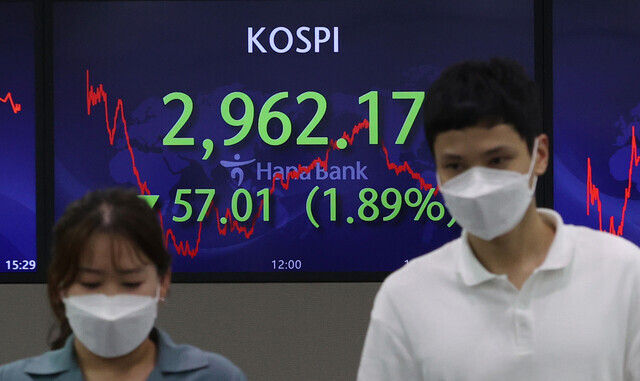hankyoreh
Links to other country sites 다른 나라 사이트 링크
KOSPI falls below 3,000 points for first time in 6 months

Korea’s benchmark stock index dipped below the 3,000-point line for the first time in more than six months over concerns about inflation, driven by the energy sector.
The Korea Composite Stock Price Index (KOSPI) dropped sharply on Tuesday, closing the day at 2,962.17, down 1.89% (57.01 points). That was the first time the KOSPI finished trading below 3,000 points since Mar. 24 (2,996.35).
The KOSPI first broke the 3,000-point barrier on Jan. 7 (3,031.68) of this year and reached an all-time record of 3,305.21 on July 6. Foreign investors pulled the index down on Tuesday, selling off more than 620 billion won (US$521.88 million) worth of stock.
Most large cap stocks took a tumble, including Samsung Electronics (-1.37%).
The technology-oriented KOSDAQ index faced an even greater shock. Korea’s secondary index closed trading at 955.37 after a 2.83% plunge (27.83 points). The yield on 10-year government bonds rose across the board to an annual rate of 2.291%.
The won-dollar exchange rate stayed level even as the global value of the dollar eroded amid choppy negotiations about raising the debt ceiling in the US.
Surging oil prices have stoked fears about inflation. On Monday, news that OPEC Plus, a consortium of oil-producing countries, had decided to keep increasing production at the current level drove the price of West Texas Intermediate crude to US$77.62 a barrel. That’s the highest price seen since Nov. 2014.
Inflation fears also caused the yield on US treasuries to rebound. Predictions that the US Federal Reserve may accelerate its timeframe for normalizing monetary policy by tapering, or reducing, its bond-buying program deflated stock prices in New York and drove the Nasdaq composite down by 2.14%.
Production disruptions resulting from power shortages in China are exacerbating fears that the price of consumer goods will spike, with no solution in the short term.
“Inflation, in general, is going to be a much bigger problem than the Fed believes,” said Jeremy Siegel, a professor at the Wharton School of the University of Pennsylvania, during an interview with CNBC. Siegel said this inflation could deliver a shock to financial markets.
By Han Gwang-deok, finance correspondent
Please direct questions or comments to [english@hani.co.kr]

Editorial・opinion
![[Column] Season 2 of special prosecutor probe may be coming to Korea soon [Column] Season 2 of special prosecutor probe may be coming to Korea soon](https://flexible.img.hani.co.kr/flexible/normal/500/300/imgdb/original/2024/0426/3317141030699447.jpg) [Column] Season 2 of special prosecutor probe may be coming to Korea soon
[Column] Season 2 of special prosecutor probe may be coming to Korea soon![[Column] Park Geun-hye déjà vu in Yoon Suk-yeol [Column] Park Geun-hye déjà vu in Yoon Suk-yeol](https://flexible.img.hani.co.kr/flexible/normal/500/300/imgdb/original/2024/0424/651713945113788.jpg) [Column] Park Geun-hye déjà vu in Yoon Suk-yeol
[Column] Park Geun-hye déjà vu in Yoon Suk-yeol- [Editorial] New weight of N. Korea’s nuclear threats makes dialogue all the more urgent
- [Guest essay] The real reason Korea’s new right wants to dub Rhee a founding father
- [Column] ‘Choson’: Is it time we start referring to N. Korea in its own terms?
- [Editorial] Japan’s rewriting of history with Korea has gone too far
- [Column] The president’s questionable capacity for dialogue
- [Column] Are chaebol firms just pizza pies for families to divvy up as they please?
- [Column] Has Korea, too, crossed the Rubicon on China?
- [Correspondent’s column] In Japan’s alliance with US, echoes of its past alliances with UK
Most viewed articles
- 1Is Japan about to snatch control of Line messenger from Korea’s Naver?
- 2‘We must say no’: Seoul defense chief on Korean, USFK involvement in hypothetical Taiwan crisis
- 3[News analysis] Using lure of fame, K-entertainment agency bigwigs sexually prey on young trainees
- 4[Column] Park Geun-hye déjà vu in Yoon Suk-yeol
- 5Will NewJeans end up collateral damage in internal feud at K-pop juggernaut Hybe?
- 6Up-and-coming Indonesian group StarBe spills what it learned during K-pop training in Seoul
- 7[Column] Season 2 of special prosecutor probe may be coming to Korea soon
- 8Korea’s 1.3% growth in Q1 signals ‘textbook’ return to growth, says government
- 9Report reveals toxic pollution at numerous USFK bases
- 10[Editorial] Statue should not be central concern of comfort women issue